
automatic-KG-creation-with-LLM
Automatic Ontology and Knowledge Graph construction with LLM
Stars: 171
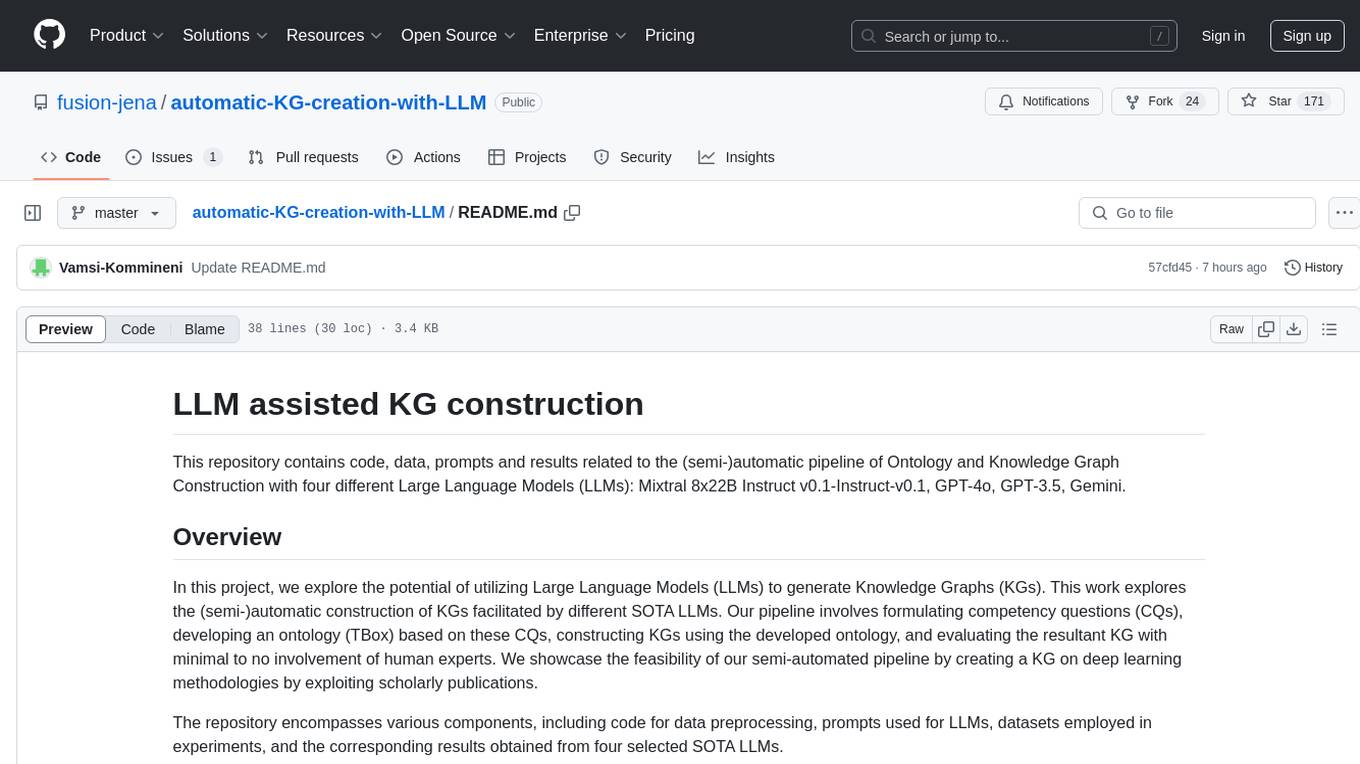
This repository presents a (semi-)automatic pipeline for Ontology and Knowledge Graph Construction using Large Language Models (LLMs) such as Mixtral 8x22B Instruct v0.1, GPT-4o, GPT-3.5, and Gemini. It explores the generation of Knowledge Graphs by formulating competency questions, developing ontologies, constructing KGs, and evaluating the results with minimal human involvement. The project showcases the creation of a KG on deep learning methodologies from scholarly publications. It includes components for data preprocessing, prompts for LLMs, datasets, and results from the selected LLMs.
README:
This repository contains code, data, prompts and results related to the (semi-)automatic pipeline of Ontology and Knowledge Graph Construction with four different Large Language Models (LLMs): Mixtral 8x22B Instruct v0.1-Instruct-v0.1, GPT-4o, GPT-3.5, Gemini.
In this project, we explore the potential of utilizing Large Language Models (LLMs) to generate Knowledge Graphs (KGs). This work explores the (semi-)automatic construction of KGs facilitated by different SOTA LLMs. Our pipeline involves formulating competency questions (CQs), developing an ontology (TBox) based on these CQs, constructing KGs using the developed ontology, and evaluating the resultant KG with minimal to no involvement of human experts. We showcase the feasibility of our semi-automated pipeline by creating a KG on deep learning methodologies by exploiting scholarly publications.
The repository encompasses various components, including code for data preprocessing, prompts used for LLMs, datasets employed in experiments, and the corresponding results obtained from four selected SOTA LLMs.
- CQs/: Contains the competency questions generated by the LLM.
- Code/: Contains code files for data preprocessing, Competency questions, ontology and KG generation, and evaluation of KGs for four SOTA LLMs.
- Data/: Contains the selected publication pdfs and their metadata
- Evaluation/: Contains human evaluations of RAG-generated CQ answers
- KG/: Contains individual KG for 30 publications for 4 SOTA LLMs
- NER/: Contains NERs for all the competency answers for SOTA LLMs
- NER_prompt/: Contains the prompts for all the selected publications, which have the instructions that are passed to different LLMs to extract named entities
- Ontology/: Contains generated ontologies from four SOTA LLMs
- RAG_CQ_Ans/: Contains the RAG-generated answers for 28 queries (selected publication)
- SOTAOntologies/: Contains the SOTA ontologies for reuse for the creation of DLProv Ontology
- Stats/: Contains all the stats generated for this publication (ontology stats, KG individual counts and others as described in manuscript)
Add the Hugging face access token in the helper_functions.py in the following line: access_token_read = os.getenv('access_token_read_hf')
Install the prerequisite using the requirements.txt file.
To run the whole pipeline, submit (execute) your job using main.py and use config.ini to customise the variables and paths
The repository is licensed under Apache License 2.0.
Kommineni, V. K., König-Ries, B., & Samuel, S. (2024). From human experts to machines: An LLM supported approach to ontology and knowledge graph construction. arXiv preprint arXiv:2403.08345. https://doi.org/10.48550/arXiv.2403.08345
Kommineni, V. K., König-Ries, B., & Samuel, S. (2024). Towards the Automation of Knowledge Graph Construction Using Large Language Models. In E. Vakaj, S. Iranmanesh, R. Stamartina, N. Mihindukulasooriya, S. Tiwari, F. Ortiz-Rodríguez & R. Mcgranaghan (Eds.), Proceedings of the 3rd International Workshop on Natural Language Processing for Knowledge Graph Creation (part of 20th International Conference on Semantic Systems (SEMANTiCS 2024)), Vol. 3874, pp. 19-34. CEUR-WS. Available at: https://ceur-ws.org/Vol-3874/paper2.pdf
For Tasks:
Click tags to check more tools for each tasksFor Jobs:
Alternative AI tools for automatic-KG-creation-with-LLM
Similar Open Source Tools

automatic-KG-creation-with-LLM
This repository presents a (semi-)automatic pipeline for Ontology and Knowledge Graph Construction using Large Language Models (LLMs) such as Mixtral 8x22B Instruct v0.1, GPT-4o, GPT-3.5, and Gemini. It explores the generation of Knowledge Graphs by formulating competency questions, developing ontologies, constructing KGs, and evaluating the results with minimal human involvement. The project showcases the creation of a KG on deep learning methodologies from scholarly publications. It includes components for data preprocessing, prompts for LLMs, datasets, and results from the selected LLMs.

nlp-llms-resources
The 'nlp-llms-resources' repository is a comprehensive resource list for Natural Language Processing (NLP) and Large Language Models (LLMs). It covers a wide range of topics including traditional NLP datasets, data acquisition, libraries for NLP, neural networks, sentiment analysis, optical character recognition, information extraction, semantics, topic modeling, multilingual NLP, domain-specific LLMs, vector databases, ethics, costing, books, courses, surveys, aggregators, newsletters, papers, conferences, and societies. The repository provides valuable information and resources for individuals interested in NLP and LLMs.
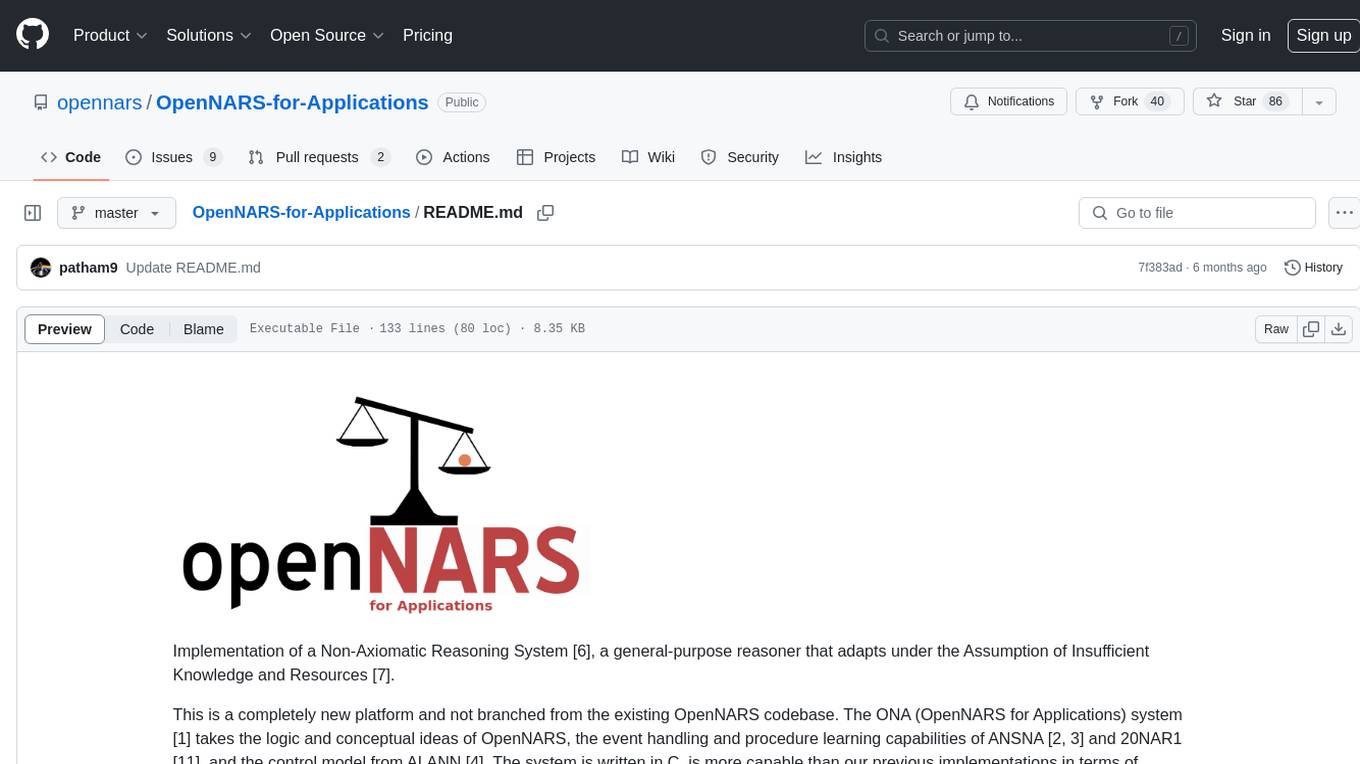
OpenNARS-for-Applications
OpenNARS-for-Applications is an implementation of a Non-Axiomatic Reasoning System, a general-purpose reasoner that adapts under the Assumption of Insufficient Knowledge and Resources. The system combines the logic and conceptual ideas of OpenNARS, event handling and procedure learning capabilities of ANSNA and 20NAR1, and the control model from ALANN. It is written in C, offers improved reasoning performance, and has been compared with Reinforcement Learning and means-end reasoning approaches. The system has been used in real-world applications such as assisting first responders, real-time traffic surveillance, and experiments with autonomous robots. It has been developed with a pragmatic mindset focusing on effective implementation of existing theory.
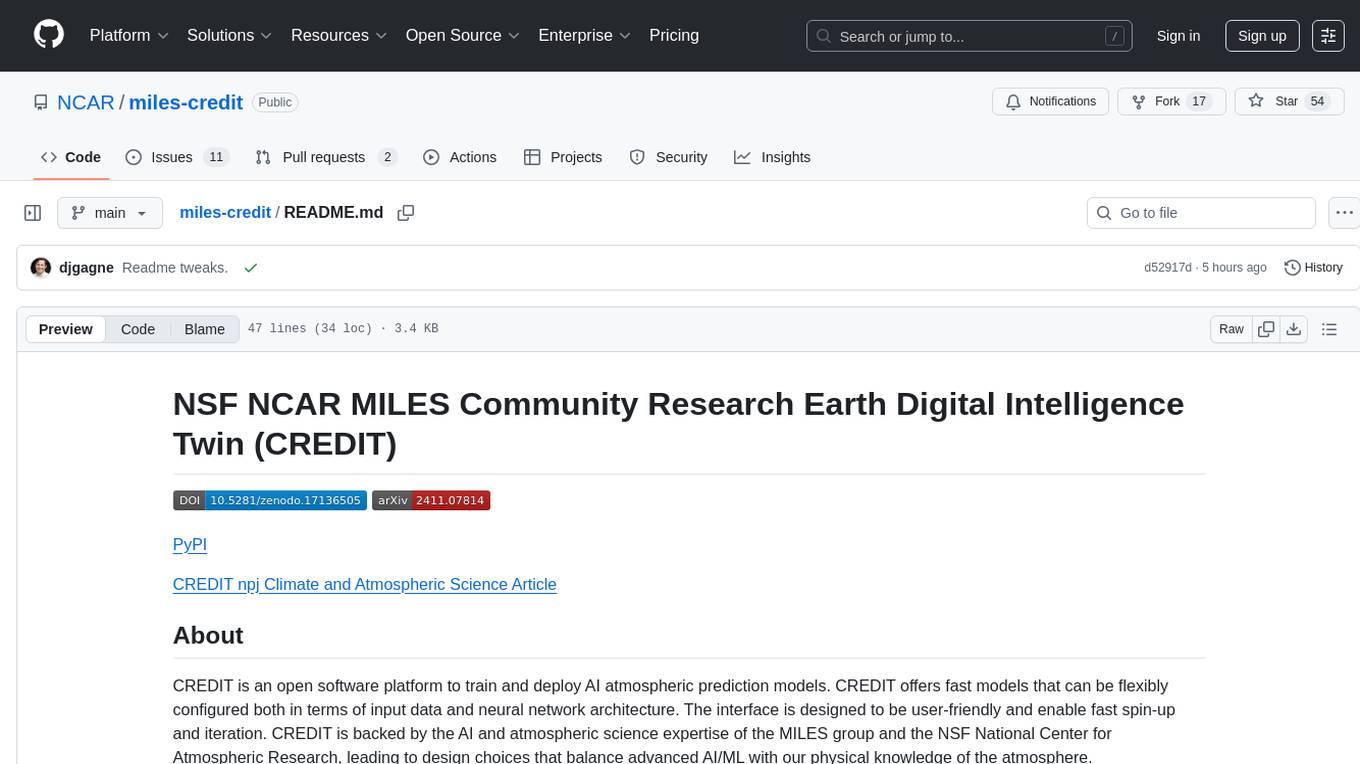
miles-credit
CREDIT is an open software platform for training and deploying AI atmospheric prediction models. It offers fast models with flexible configuration options for input data and neural network architecture. The user-friendly interface enables quick setup and iteration. Developed by the MILES group and NSF National Center for Atmospheric Research, CREDIT combines advanced AI/ML with atmospheric science expertise. It provides a stable release with various models, training, and deployment options, with ongoing development. Detailed documentation is available for installation, training, deployment, config file interpretation, and API usage.
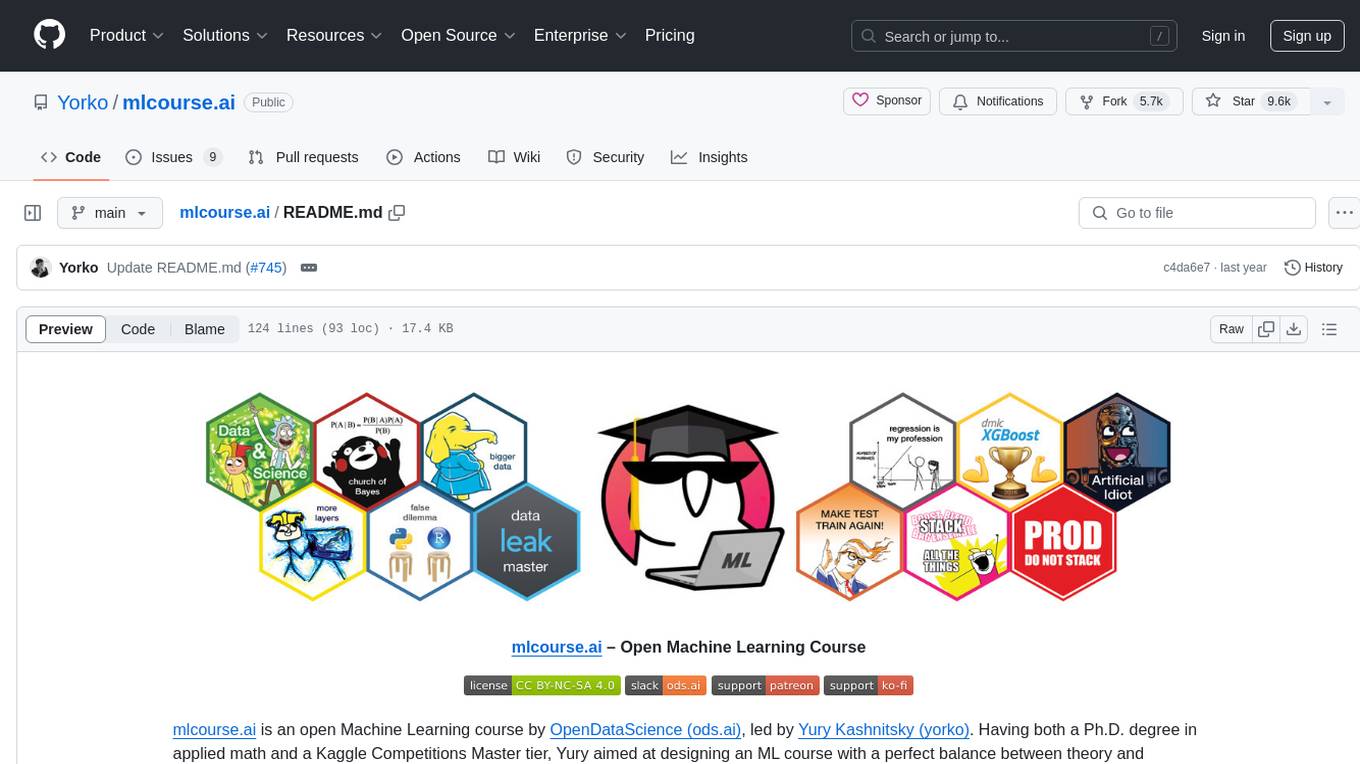
mlcourse.ai
mlcourse.ai is an open Machine Learning course by OpenDataScience (ods.ai), led by Yury Kashnitsky (yorko). The course offers a perfect balance between theory and practice, with math formulae in lectures and practical assignments including Kaggle Inclass competitions. It is currently in a self-paced mode, guiding users through 10 weeks of content covering topics from Pandas to Gradient Boosting. The course provides articles, lectures, and assignments to enhance understanding and application of machine learning concepts.
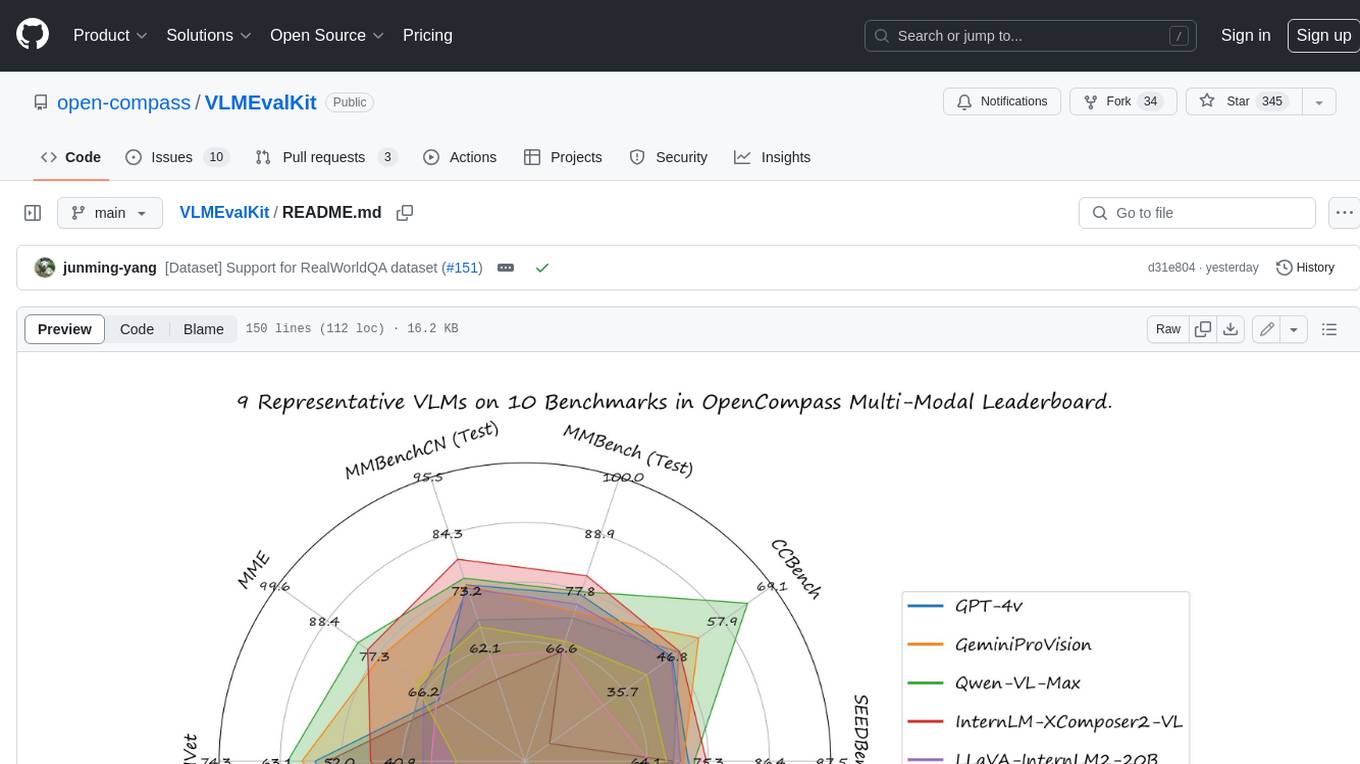
VLMEvalKit
VLMEvalKit is an open-source evaluation toolkit of large vision-language models (LVLMs). It enables one-command evaluation of LVLMs on various benchmarks, without the heavy workload of data preparation under multiple repositories. In VLMEvalKit, we adopt generation-based evaluation for all LVLMs, and provide the evaluation results obtained with both exact matching and LLM-based answer extraction.
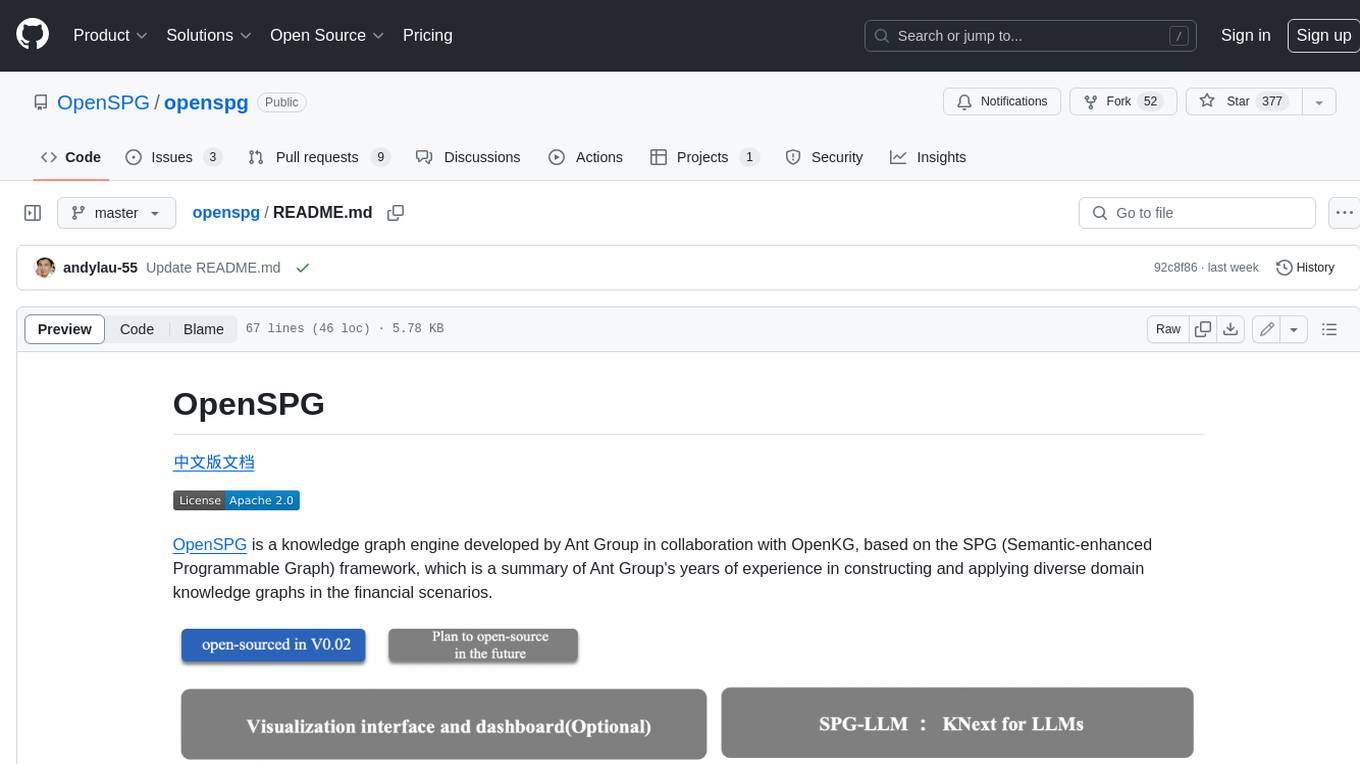
openspg
OpenSPG is a knowledge graph engine developed by Ant Group in collaboration with OpenKG, based on the SPG (Semantic-enhanced Programmable Graph) framework. It provides explicit semantic representations, logical rule definitions, operator frameworks (construction, inference), and other capabilities for domain knowledge graphs. OpenSPG supports pluggable adaptation of basic engines and algorithmic services by various vendors to build customized solutions.
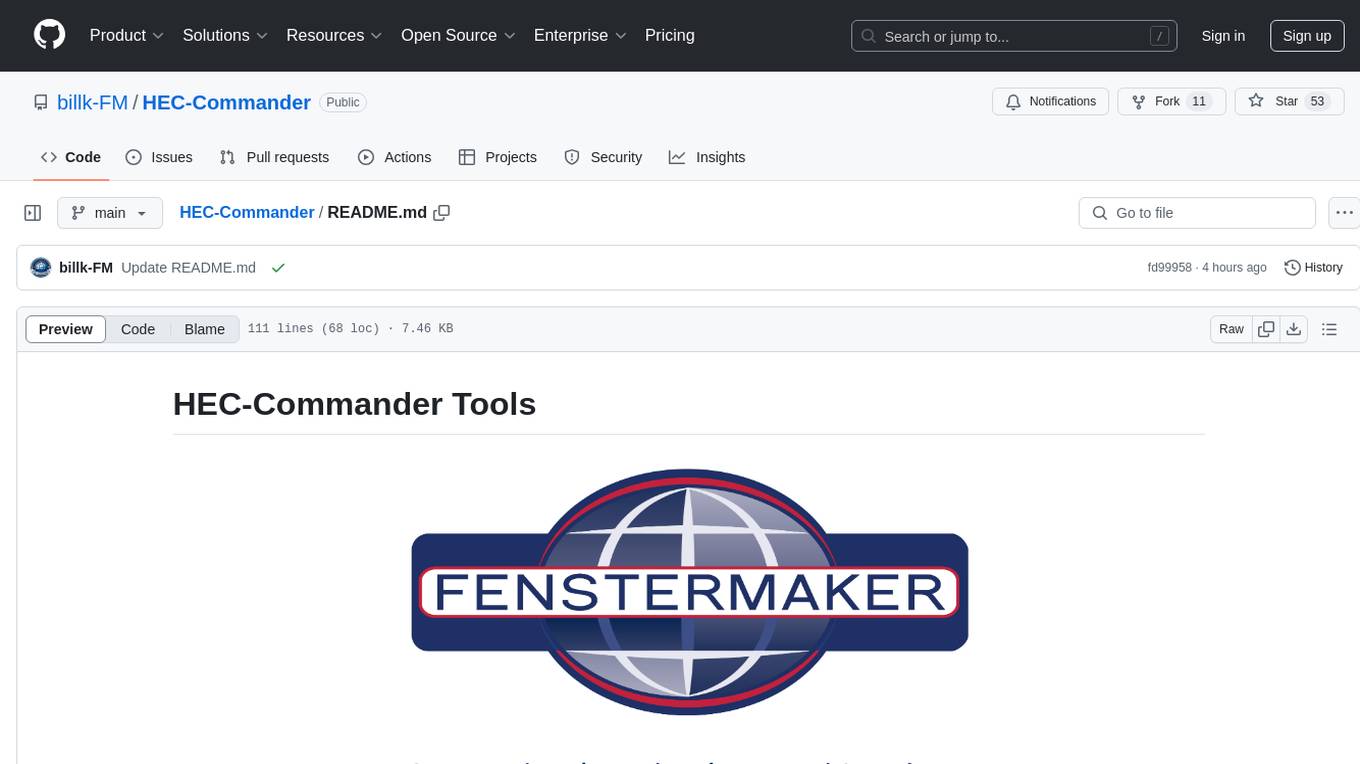
HEC-Commander
HEC-Commander Tools is a suite of python notebooks developed with AI assistance for water resource engineering workflows, providing automation for HEC-RAS and HEC-HMS through Jupyter Notebooks. It contains automation scripts for HEC-HMS, HEC-RAS, and DSS, along with miscellaneous tools. The repository also includes blog posts, ChatGPT assistants, and presentations related to H&H modeling and water resources workflows. Developed to support Region 4 of the Louisiana Watershed Initiative by Fenstermaker.
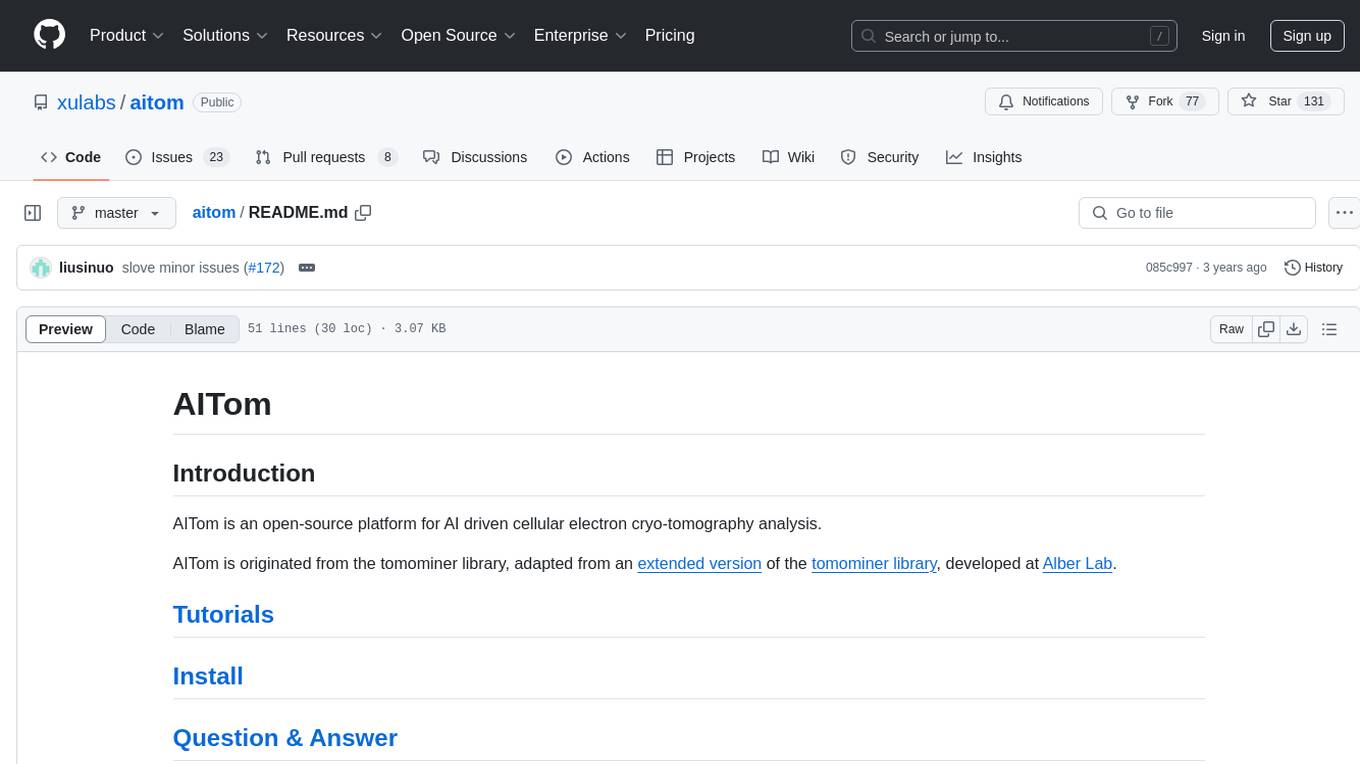
aitom
AITom is an open-source platform for AI-driven cellular electron cryo-tomography analysis. It is developed to process large amounts of Cryo-ET data, reconstruct, detect, classify, recover, and spatially model different cellular components using state-of-the-art machine learning approaches. The platform aims to automate cellular structure discovery and provide new insights into molecular biology and medical applications.
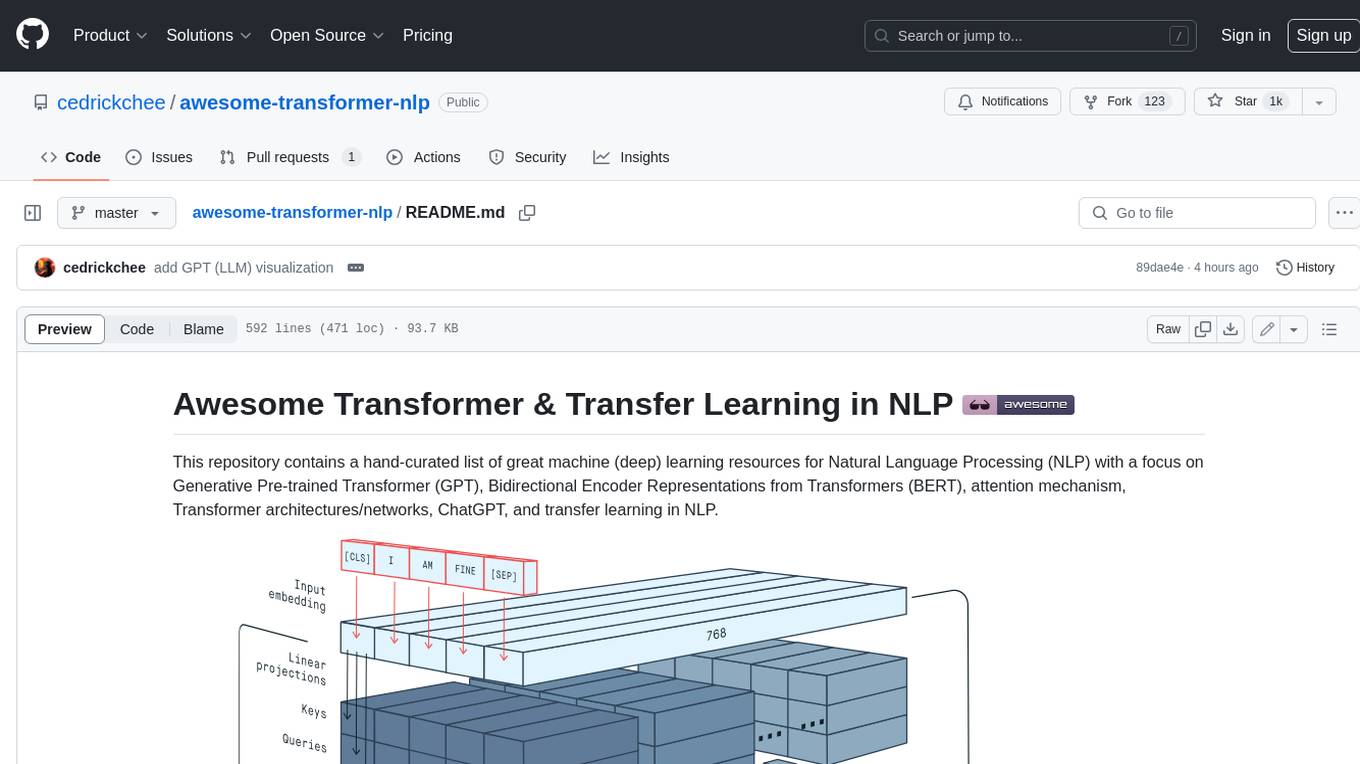
awesome-transformer-nlp
This repository contains a hand-curated list of great machine (deep) learning resources for Natural Language Processing (NLP) with a focus on Generative Pre-trained Transformer (GPT), Bidirectional Encoder Representations from Transformers (BERT), attention mechanism, Transformer architectures/networks, Chatbot, and transfer learning in NLP.
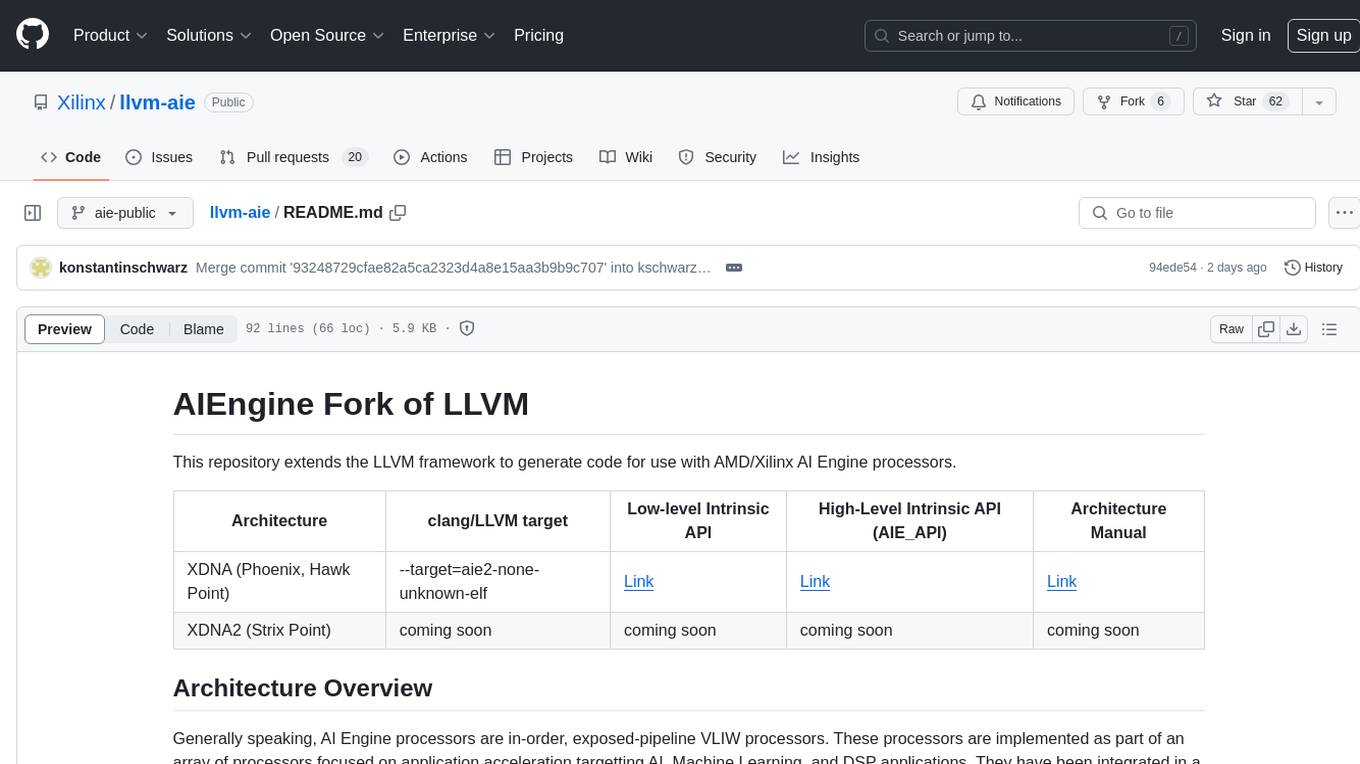
llvm-aie
This repository extends the LLVM framework to generate code for use with AMD/Xilinx AI Engine processors. AI Engine processors are in-order, exposed-pipeline VLIW processors focused on application acceleration for AI, Machine Learning, and DSP applications. The repository adds LLVM support for specific features like non-power of 2 pointers, operand latencies, resource conflicts, negative operand latencies, slot assignment, relocations, code alignment restrictions, and register allocation. It includes support for Clang, LLD, binutils, Compiler-RT, and LLVM-LIBC.
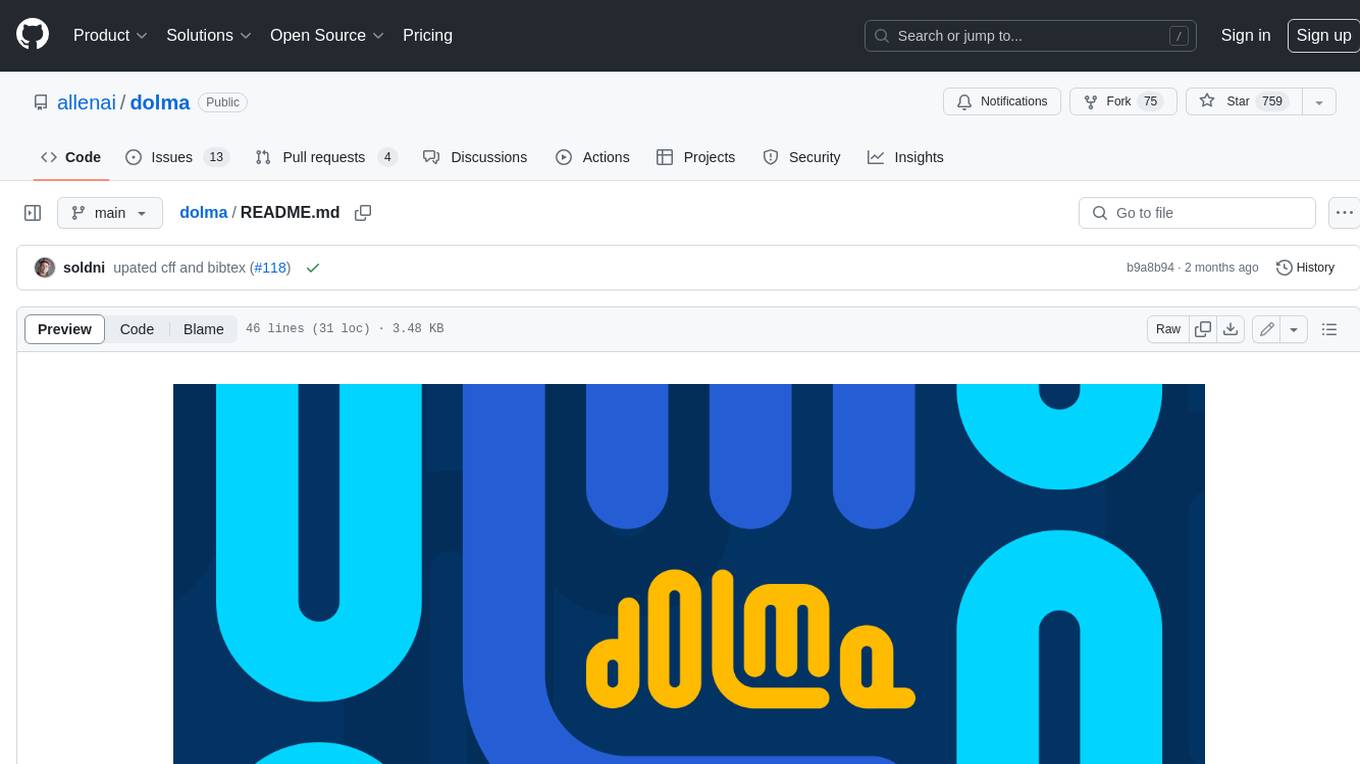
dolma
Dolma is a dataset and toolkit for curating large datasets for (pre)-training ML models. The dataset consists of 3 trillion tokens from a diverse mix of web content, academic publications, code, books, and encyclopedic materials. The toolkit provides high-performance, portable, and extensible tools for processing, tagging, and deduplicating documents. Key features of the toolkit include built-in taggers, fast deduplication, and cloud support.
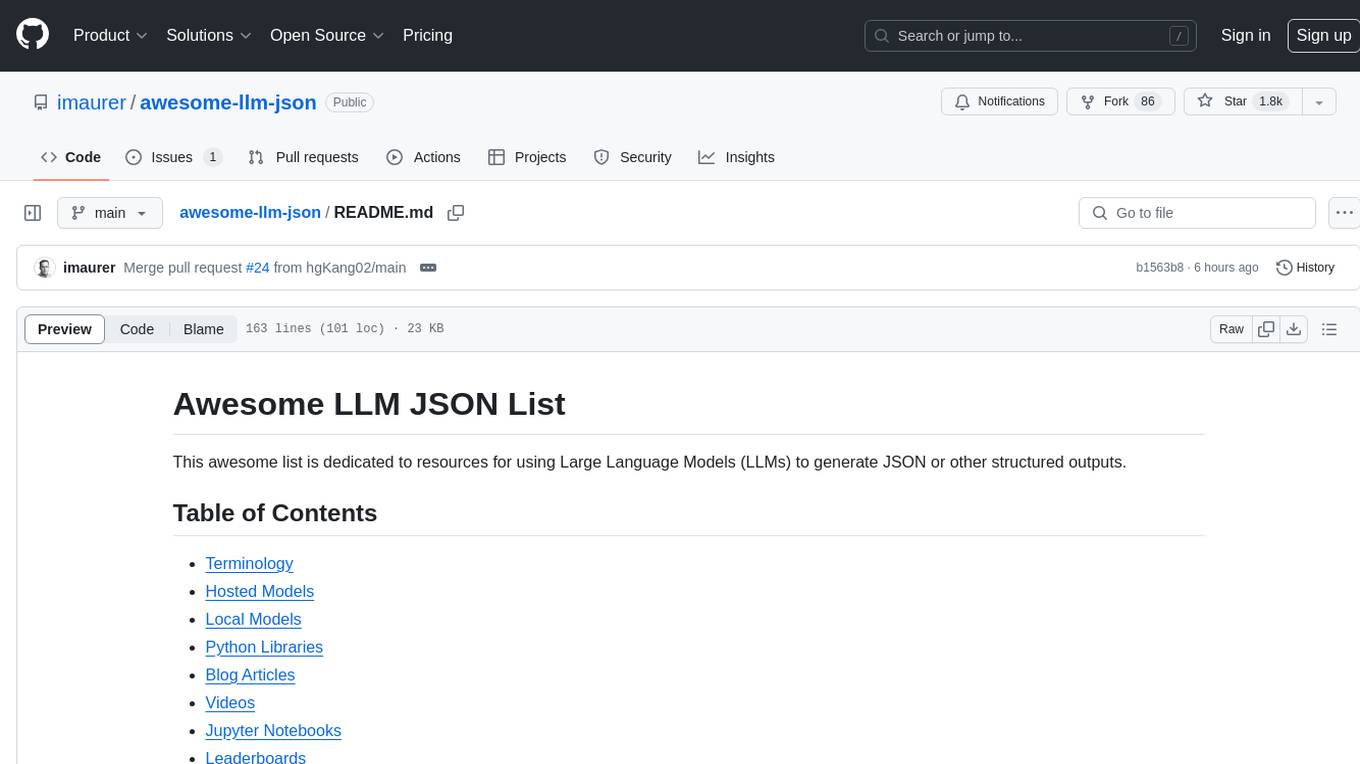
awesome-llm-json
This repository is an awesome list dedicated to resources for using Large Language Models (LLMs) to generate JSON or other structured outputs. It includes terminology explanations, hosted and local models, Python libraries, blog articles, videos, Jupyter notebooks, and leaderboards related to LLMs and JSON generation. The repository covers various aspects such as function calling, JSON mode, guided generation, and tool usage with different providers and models.
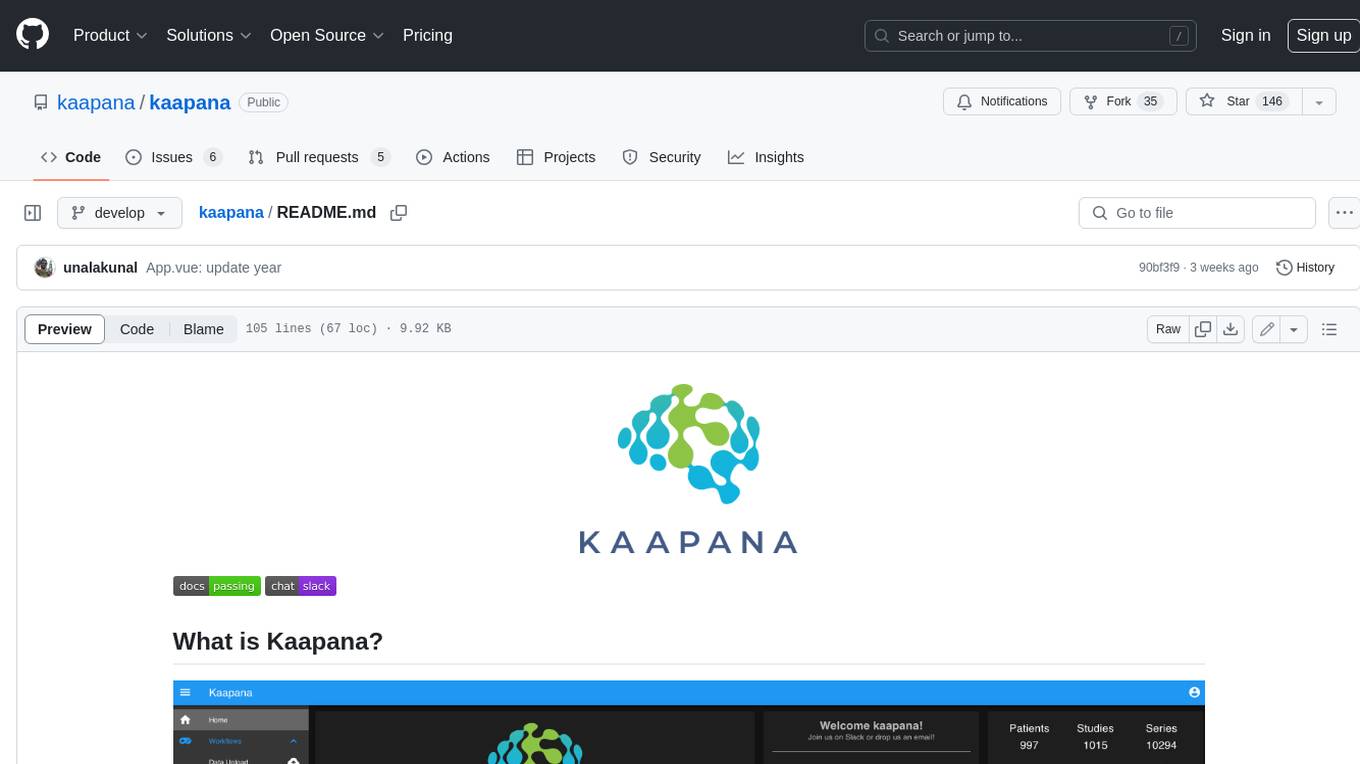
kaapana
Kaapana is an open-source toolkit for state-of-the-art platform provisioning in the field of medical data analysis. The applications comprise AI-based workflows and federated learning scenarios with a focus on radiological and radiotherapeutic imaging. Obtaining large amounts of medical data necessary for developing and training modern machine learning methods is an extremely challenging effort that often fails in a multi-center setting, e.g. due to technical, organizational and legal hurdles. A federated approach where the data remains under the authority of the individual institutions and is only processed on-site is, in contrast, a promising approach ideally suited to overcome these difficulties. Following this federated concept, the goal of Kaapana is to provide a framework and a set of tools for sharing data processing algorithms, for standardized workflow design and execution as well as for performing distributed method development. This will facilitate data analysis in a compliant way enabling researchers and clinicians to perform large-scale multi-center studies. By adhering to established standards and by adopting widely used open technologies for private cloud development and containerized data processing, Kaapana integrates seamlessly with the existing clinical IT infrastructure, such as the Picture Archiving and Communication System (PACS), and ensures modularity and easy extensibility.
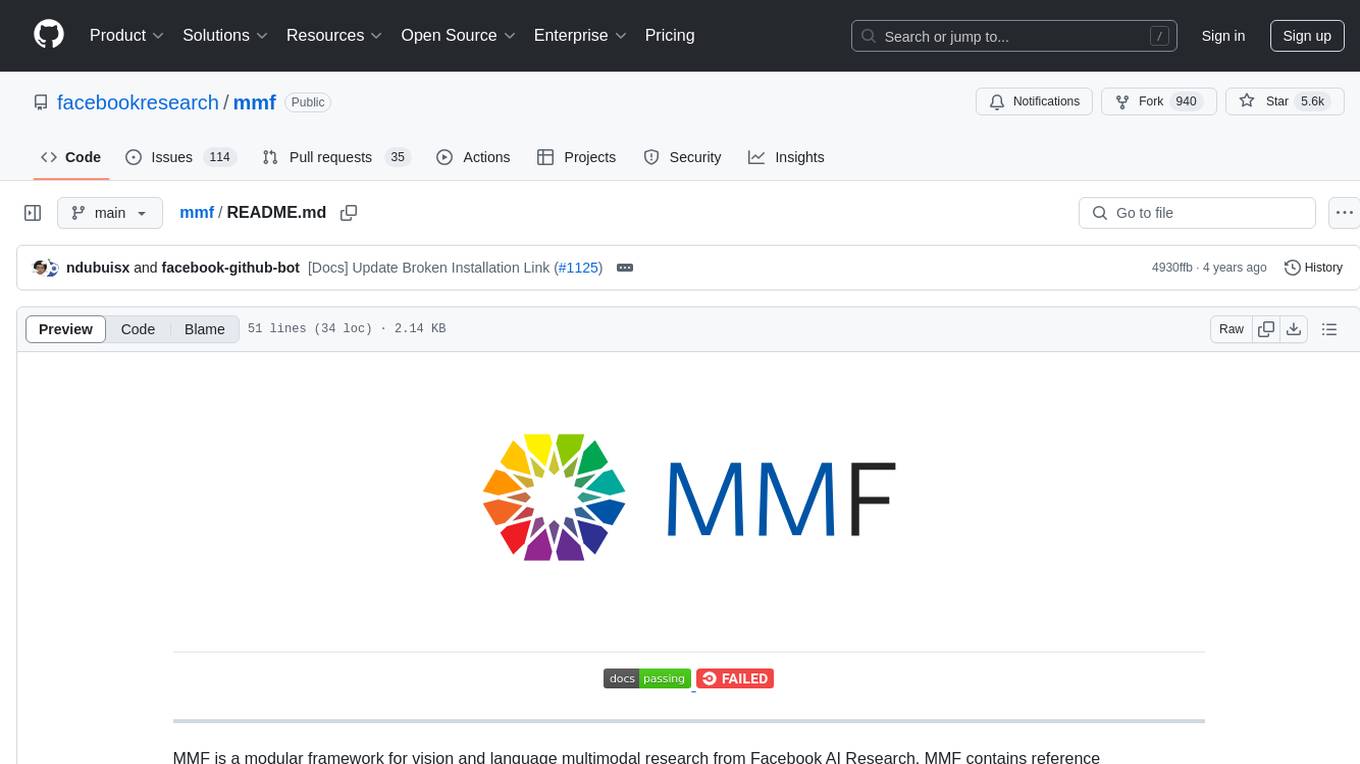
mmf
MMF is a modular framework for vision and language multimodal research from Facebook AI Research. It contains reference implementations of state-of-the-art vision and language models, allowing distributed training. MMF serves as a starter codebase for challenges around vision and language datasets, such as The Hateful Memes, TextVQA, TextCaps, and VQA challenges. It is scalable, fast, and un-opinionated, providing a solid foundation for vision and language multimodal research projects.
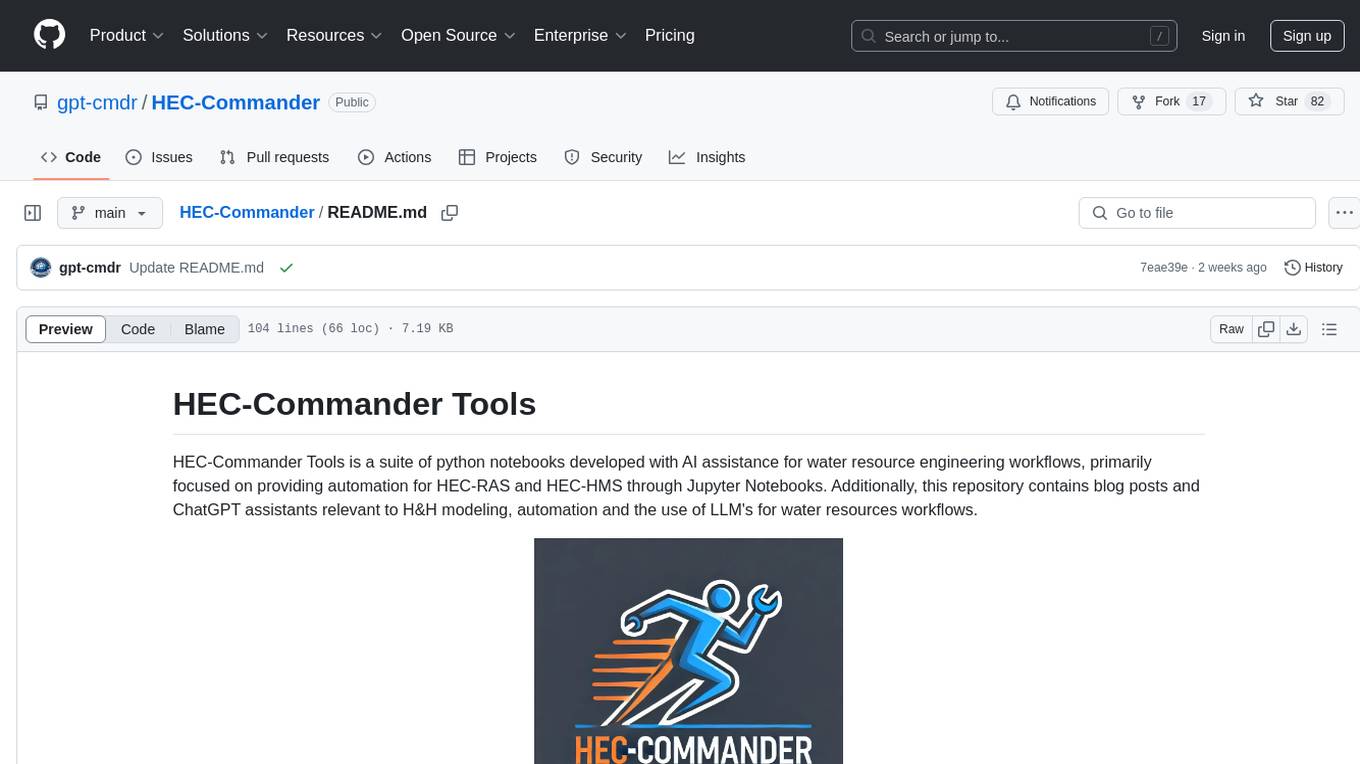
HEC-Commander
HEC-Commander Tools is a suite of python notebooks developed with AI assistance for water resource engineering workflows, focused on providing automation for HEC-RAS and HEC-HMS through Jupyter Notebooks. It contains automation scripts for HEC-HMS and HEC-RAS, tools for plotting results, and miscellaneous scripts for workflow assistance. The repository also includes blog posts, ChatGPT assistants, and presentations related to H&H modeling and the use of LLM's for water resources workflows.
For similar tasks

automatic-KG-creation-with-LLM
This repository presents a (semi-)automatic pipeline for Ontology and Knowledge Graph Construction using Large Language Models (LLMs) such as Mixtral 8x22B Instruct v0.1, GPT-4o, GPT-3.5, and Gemini. It explores the generation of Knowledge Graphs by formulating competency questions, developing ontologies, constructing KGs, and evaluating the results with minimal human involvement. The project showcases the creation of a KG on deep learning methodologies from scholarly publications. It includes components for data preprocessing, prompts for LLMs, datasets, and results from the selected LLMs.
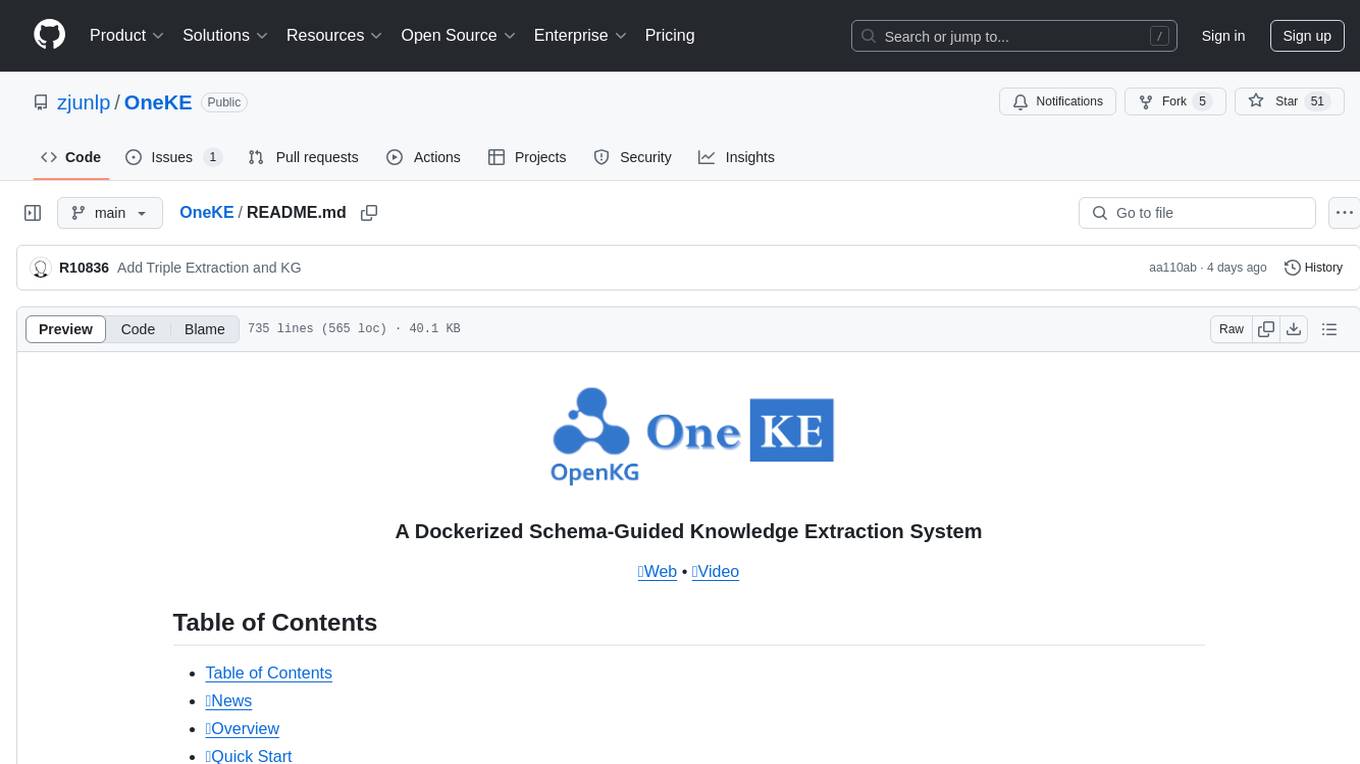
OneKE
OneKE is a flexible dockerized system for schema-guided knowledge extraction, capable of extracting information from the web and raw PDF books across multiple domains like science and news. It employs a collaborative multi-agent approach and includes a user-customizable knowledge base to enable tailored extraction. OneKE offers various IE tasks support, data sources support, LLMs support, extraction method support, and knowledge base configuration. Users can start with examples using YAML, Python, or Web UI, and perform tasks like Named Entity Recognition, Relation Extraction, Event Extraction, Triple Extraction, and Open Domain IE. The tool supports different source formats like Plain Text, HTML, PDF, Word, TXT, and JSON files. Users can choose from various extraction models like OpenAI, DeepSeek, LLaMA, Qwen, ChatGLM, MiniCPM, and OneKE for information extraction tasks. Extraction methods include Schema Agent, Extraction Agent, and Reflection Agent. The tool also provides support for schema repository and case repository management, along with solutions for network issues. Contributors to the project include Ningyu Zhang, Haofen Wang, Yujie Luo, Xiangyuan Ru, Kangwei Liu, Lin Yuan, Mengshu Sun, Lei Liang, Zhiqiang Zhang, Jun Zhou, Lanning Wei, Da Zheng, and Huajun Chen.
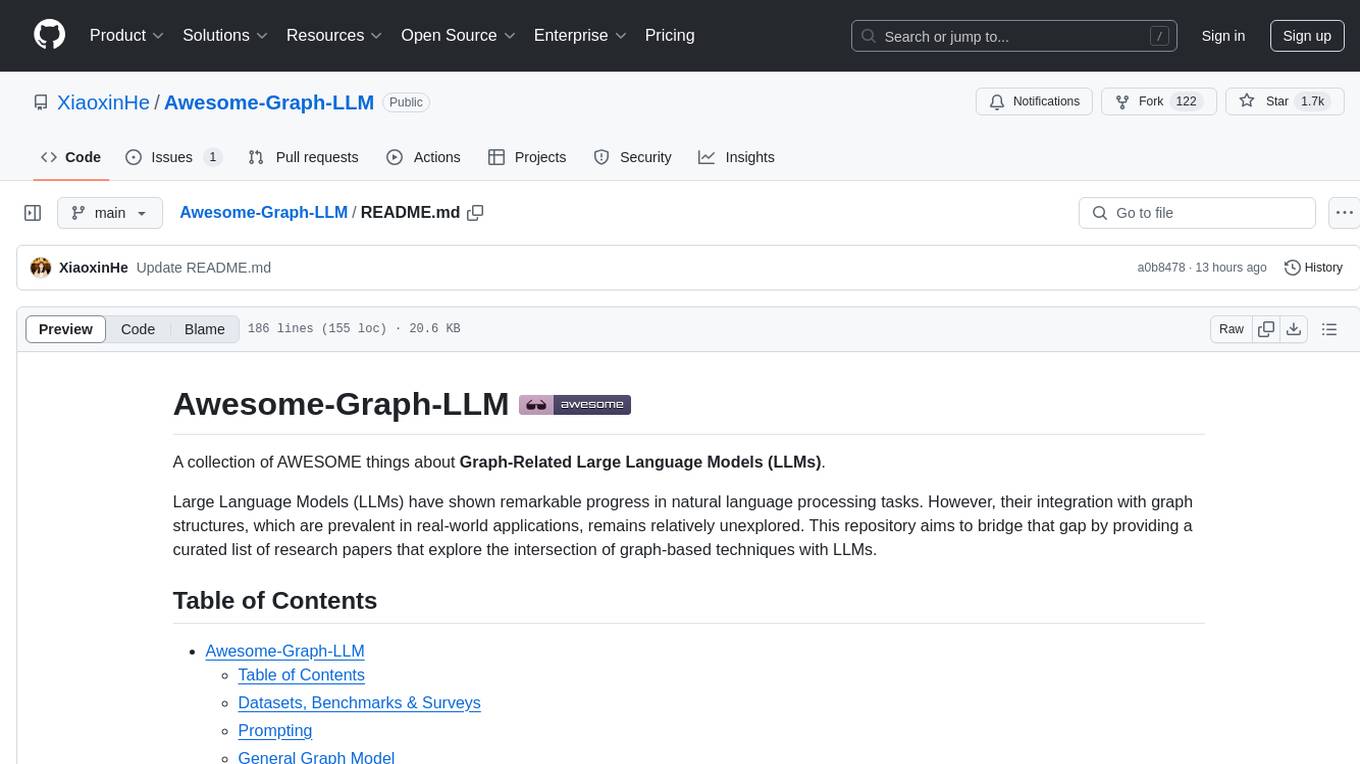
Awesome-Graph-LLM
Awesome-Graph-LLM is a curated collection of research papers exploring the intersection of graph-based techniques with Large Language Models (LLMs). The repository aims to bridge the gap between LLMs and graph structures prevalent in real-world applications by providing a comprehensive list of papers covering various aspects of graph reasoning, node classification, graph classification/regression, knowledge graphs, multimodal models, applications, and tools. It serves as a valuable resource for researchers and practitioners interested in leveraging LLMs for graph-related tasks.
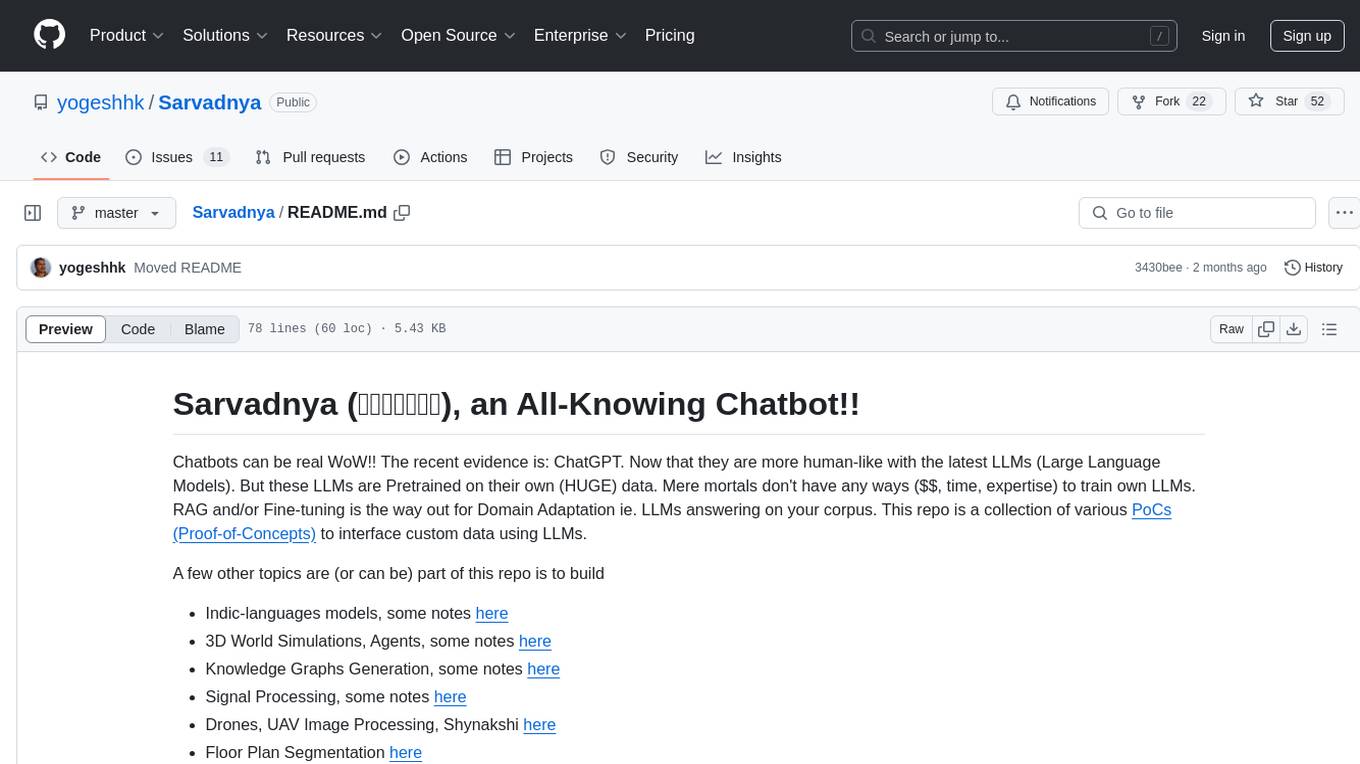
Sarvadnya
Sarvadnya is a repository focused on interfacing custom data using Large Language Models (LLMs) through Proof-of-Concepts (PoCs) like Retrieval Augmented Generation (RAG) and Fine-Tuning. It aims to enable domain adaptation for LLMs to answer on user-specific corpora. The repository also covers topics such as Indic-languages models, 3D World Simulations, Knowledge Graphs Generation, Signal Processing, Drones, UAV Image Processing, and Floor Plan Segmentation. It provides insights into building chatbots of various modalities, preparing videos, and creating content for different platforms like Medium, LinkedIn, and YouTube. The tech stacks involved range from enterprise solutions like Google Doc AI and Microsoft Azure Language AI Services to open-source tools like Langchain and HuggingFace.
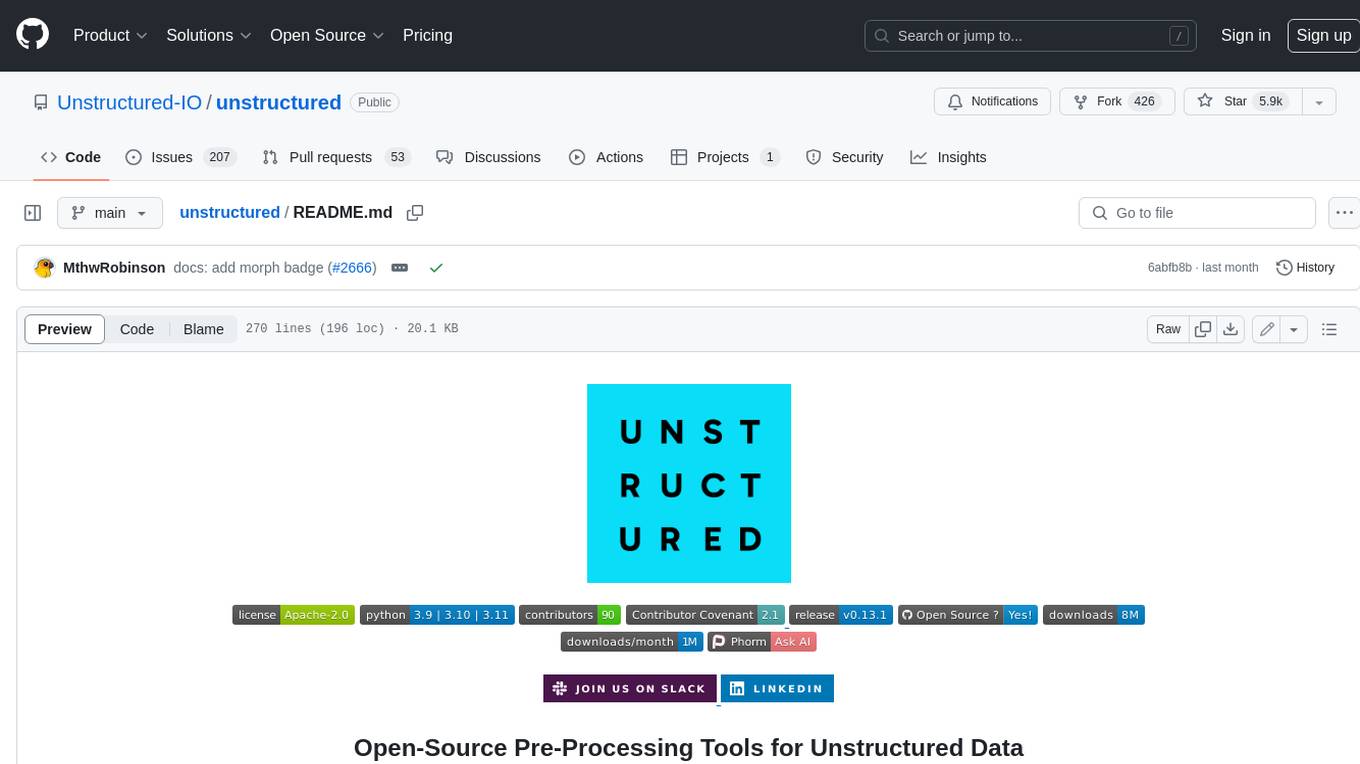
unstructured
The `unstructured` library provides open-source components for ingesting and pre-processing images and text documents, such as PDFs, HTML, Word docs, and many more. The use cases of `unstructured` revolve around streamlining and optimizing the data processing workflow for LLMs. `unstructured` modular functions and connectors form a cohesive system that simplifies data ingestion and pre-processing, making it adaptable to different platforms and efficient in transforming unstructured data into structured outputs.
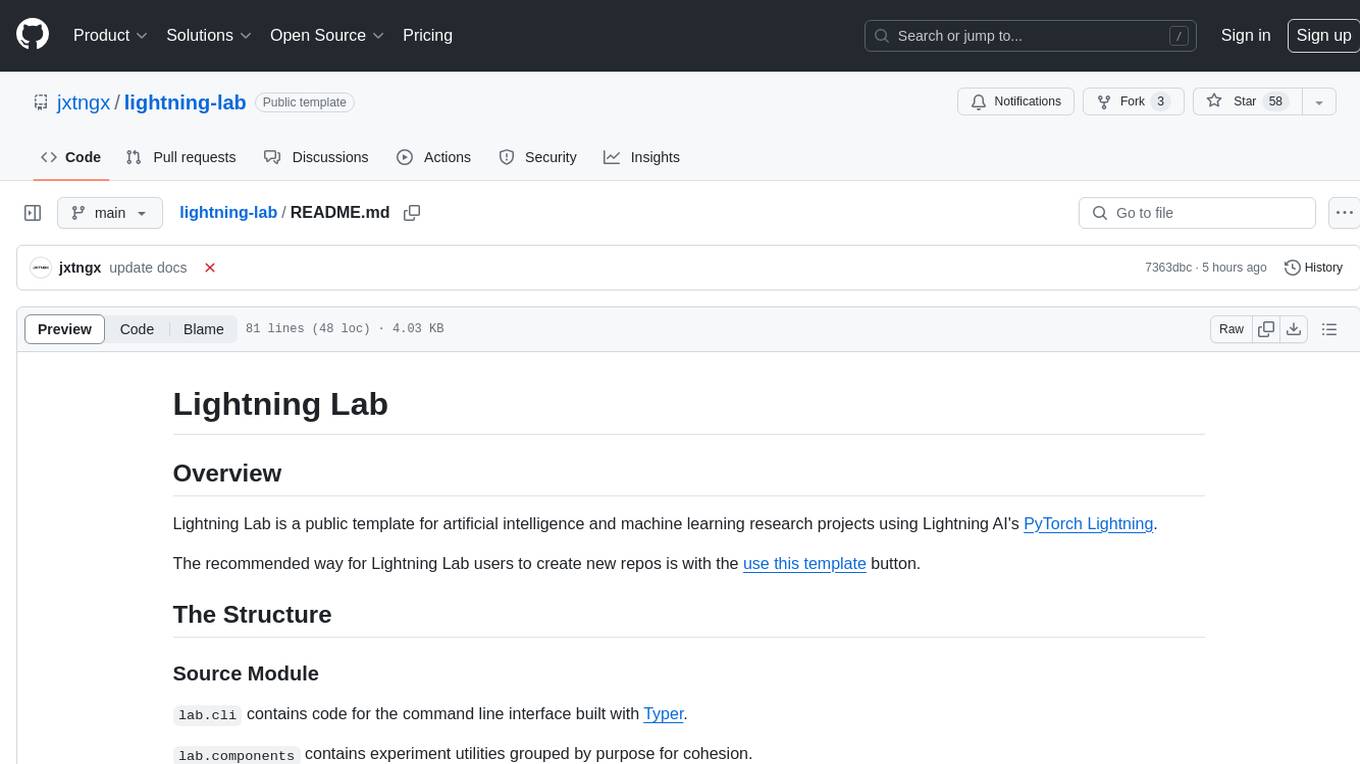
lightning-lab
Lightning Lab is a public template for artificial intelligence and machine learning research projects using Lightning AI's PyTorch Lightning. It provides a structured project layout with modules for command line interface, experiment utilities, Lightning Module and Trainer, data acquisition and preprocessing, model serving APIs, project configurations, training checkpoints, technical documentation, logs, notebooks for data analysis, requirements management, testing, and packaging. The template simplifies the setup of deep learning projects and offers extras for different domains like vision, text, audio, reinforcement learning, and forecasting.
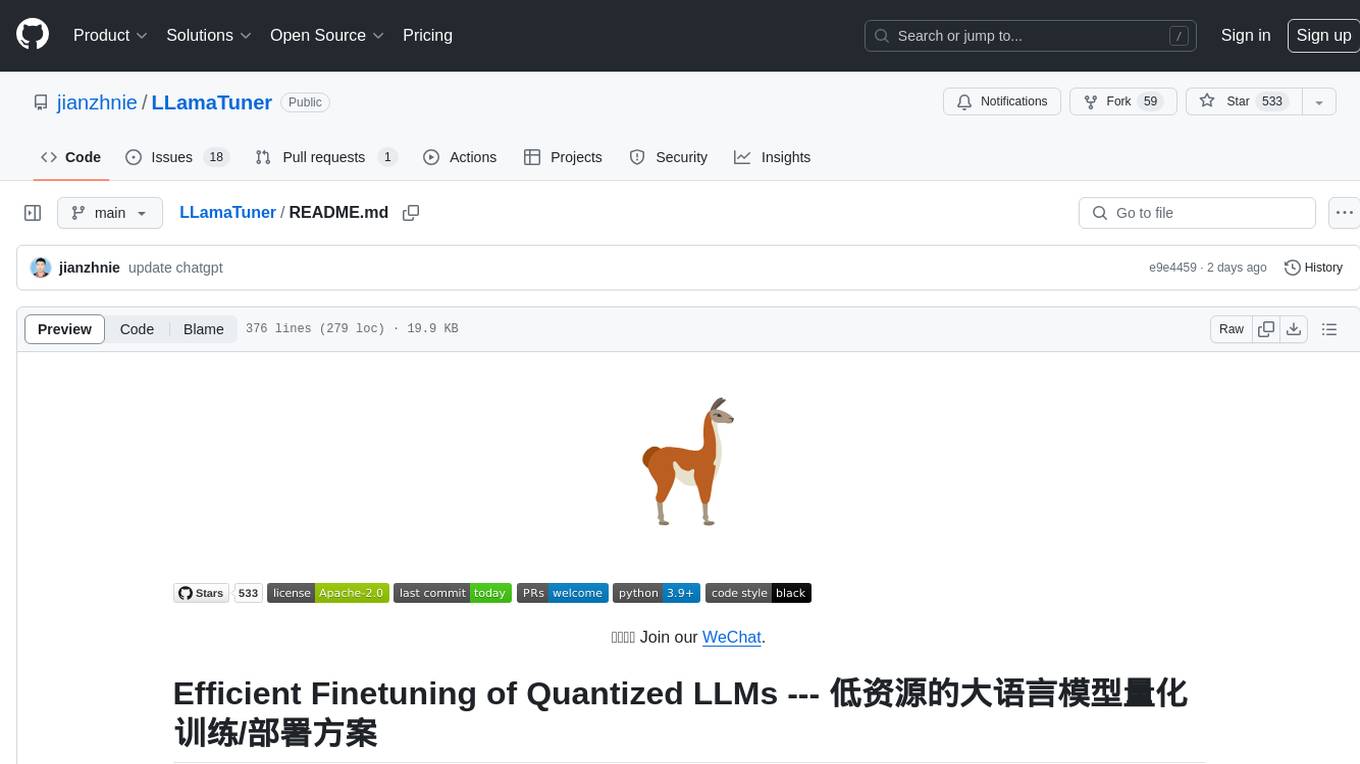
LLamaTuner
LLamaTuner is a repository for the Efficient Finetuning of Quantized LLMs project, focusing on building and sharing instruction-following Chinese baichuan-7b/LLaMA/Pythia/GLM model tuning methods. The project enables training on a single Nvidia RTX-2080TI and RTX-3090 for multi-round chatbot training. It utilizes bitsandbytes for quantization and is integrated with Huggingface's PEFT and transformers libraries. The repository supports various models, training approaches, and datasets for supervised fine-tuning, LoRA, QLoRA, and more. It also provides tools for data preprocessing and offers models in the Hugging Face model hub for inference and finetuning. The project is licensed under Apache 2.0 and acknowledges contributions from various open-source contributors.
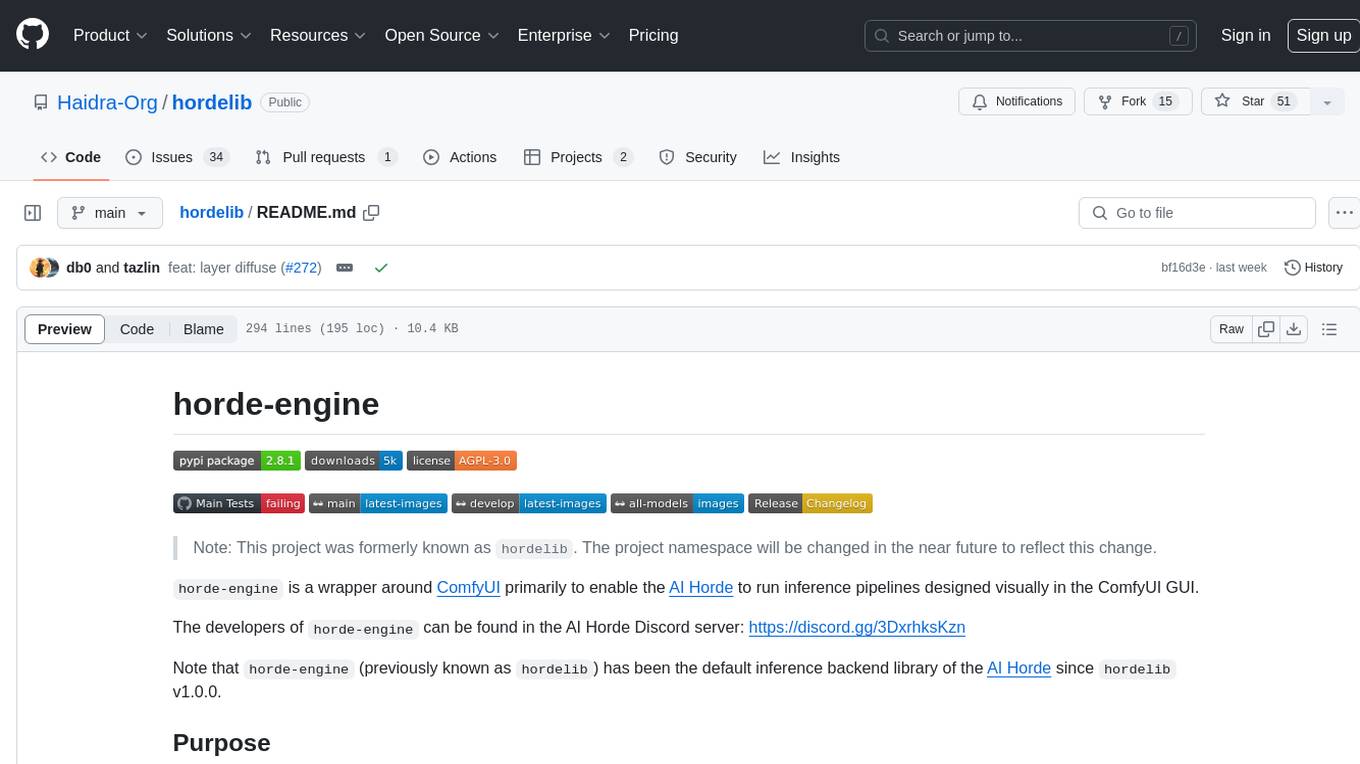
hordelib
horde-engine is a wrapper around ComfyUI designed to run inference pipelines visually designed in the ComfyUI GUI. It enables users to design inference pipelines in ComfyUI and then call them programmatically, maintaining compatibility with the existing horde implementation. The library provides features for processing Horde payloads, initializing the library, downloading and validating models, and generating images based on input data. It also includes custom nodes for preprocessing and tasks such as face restoration and QR code generation. The project depends on various open source projects and bundles some dependencies within the library itself. Users can design ComfyUI pipelines, convert them to the backend format, and run them using the run_image_pipeline() method in hordelib.comfy.Comfy(). The project is actively developed and tested using git, tox, and a specific model directory structure.
For similar jobs

sweep
Sweep is an AI junior developer that turns bugs and feature requests into code changes. It automatically handles developer experience improvements like adding type hints and improving test coverage.

teams-ai
The Teams AI Library is a software development kit (SDK) that helps developers create bots that can interact with Teams and Microsoft 365 applications. It is built on top of the Bot Framework SDK and simplifies the process of developing bots that interact with Teams' artificial intelligence capabilities. The SDK is available for JavaScript/TypeScript, .NET, and Python.

ai-guide
This guide is dedicated to Large Language Models (LLMs) that you can run on your home computer. It assumes your PC is a lower-end, non-gaming setup.

classifai
Supercharge WordPress Content Workflows and Engagement with Artificial Intelligence. Tap into leading cloud-based services like OpenAI, Microsoft Azure AI, Google Gemini and IBM Watson to augment your WordPress-powered websites. Publish content faster while improving SEO performance and increasing audience engagement. ClassifAI integrates Artificial Intelligence and Machine Learning technologies to lighten your workload and eliminate tedious tasks, giving you more time to create original content that matters.

chatbot-ui
Chatbot UI is an open-source AI chat app that allows users to create and deploy their own AI chatbots. It is easy to use and can be customized to fit any need. Chatbot UI is perfect for businesses, developers, and anyone who wants to create a chatbot.

BricksLLM
BricksLLM is a cloud native AI gateway written in Go. Currently, it provides native support for OpenAI, Anthropic, Azure OpenAI and vLLM. BricksLLM aims to provide enterprise level infrastructure that can power any LLM production use cases. Here are some use cases for BricksLLM: * Set LLM usage limits for users on different pricing tiers * Track LLM usage on a per user and per organization basis * Block or redact requests containing PIIs * Improve LLM reliability with failovers, retries and caching * Distribute API keys with rate limits and cost limits for internal development/production use cases * Distribute API keys with rate limits and cost limits for students

uAgents
uAgents is a Python library developed by Fetch.ai that allows for the creation of autonomous AI agents. These agents can perform various tasks on a schedule or take action on various events. uAgents are easy to create and manage, and they are connected to a fast-growing network of other uAgents. They are also secure, with cryptographically secured messages and wallets.

griptape
Griptape is a modular Python framework for building AI-powered applications that securely connect to your enterprise data and APIs. It offers developers the ability to maintain control and flexibility at every step. Griptape's core components include Structures (Agents, Pipelines, and Workflows), Tasks, Tools, Memory (Conversation Memory, Task Memory, and Meta Memory), Drivers (Prompt and Embedding Drivers, Vector Store Drivers, Image Generation Drivers, Image Query Drivers, SQL Drivers, Web Scraper Drivers, and Conversation Memory Drivers), Engines (Query Engines, Extraction Engines, Summary Engines, Image Generation Engines, and Image Query Engines), and additional components (Rulesets, Loaders, Artifacts, Chunkers, and Tokenizers). Griptape enables developers to create AI-powered applications with ease and efficiency.